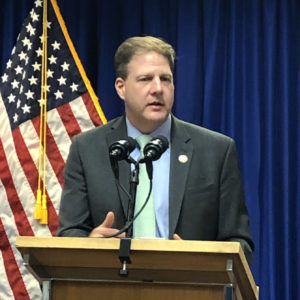Gov. Chris Sununu told NHJournal Thursday he’s called Massachusetts Gov. Charlie Baker about the state’s cross-border income-tax policy. Still, the New Hampshire Republican has yet to announce any specific actions he plans to take to defend Granite State workers.
“As soon as we really realized the crux of the issue, I called Charlie Baker first and foremost,” Sununu said. “We talked about it briefly. I told him that our Attorney General was going to be looking into it, and that’s exactly what we did.”
In March, the Massachusetts Department of Revenue issued an executive decision that the approximately 83,000 New Hampshire residents who normally commuted to the Bay State to work but were staying home due to the coronavirus pandemic would be taxed as though they were still crossing the state line. Under existing law, that work should be exempt from Massachusetts’ 5 percent income tax.
Amy Pitter, president and CEO of the Massachusetts Society of CPAs and a former Massachusetts Commissioner of Revenue, put it this way in an interview on Boston’s WBUR radio:
“Massachusetts basically said, ‘look, what we want to do is pretend this is not happening. We want to create a fiction to say, let’s maintain the status quo, do everything exactly the same way we did it pre-COVID so that we’re not requiring employers to jump through a lot of very complicated hoops and [rework] their payroll systems for something that’s only going to be in place for a number of months.'”
Pitter maintains that there isn’t anything the state of New Hampshire can do to prevent Massachusetts’ reach across its border, arguing that about half of the states in a similar position are making the same decision.
“I don’t even know what that would look like,” Pitter said regarding a theoretical challenge by the Granite State. “I don’t know what their [the state of New Hampshire] beef would be.”
Prominent New Hampshire tax attorney Bill Ardinger doesn’t agree. He told NHJournal there are several avenues for Gov. Sununu to counterattack. The state has an interest in protecting its sovereignty, which it appears Massachusetts is violating by extending its income tax into the home offices of the Granite State.
And, Ardinger says, New Hampshire’s already been involved in a similar fight, playing Massachusetts’ role. In 1975, New Hampshire had a commuter tax on the income of nonresidents earned in the state. It also levied a tax on residents income earned outside the state, but then nullified that tax in another section of state law.
A Maine resident who worked in New Hampshire challenged the tax in a case that went all the way to the U.S. Supreme Court (Austin versus New Hampshire). New Hampshire lost in a 7-1 decision,* with the court concluding the scheme violated the Privileges and Immunities Clause.
“Massachusetts is attempting something similar now,” Ardinger says.
So why hasn’t Sununu acted before now? “We responded as soon as the issue was brought to bear,” Sununu said. “I don’t spend my time looking at the special rules of Massachusetts, especially during the COVID pandemic, but when people bring this stuff to our attention, we don’t let it sit on the shelf. We act very quickly.”
Massachusetts has announced a public hearing on the policy on August 27, and they’ve also announced that the policy is scheduled to end on December 31. But nobody knows how long the COVID-19 disruptions will last, and given that Massachusetts “pretended” the New Hampshire work happened on their side of the border once before, there’s no reason they couldn’t do the same via fiat again in the future.
According to Ardinger, it’s up to Sununu to lead on this issue.
“It starts with Gov. Sununu. It starts with him standing up for the rights of the state of New Hampshire, which includes ensuring reasonable protections from overly-aggressive out-of-state tax agencies.”
*Justice William O. Douglas suffered a debilitating stroke in 1974 but refused to step down until late 1975.



